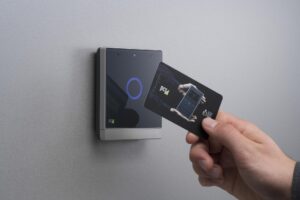Access control systems can help you improve security for your building and its occupants. There are many benefits of having access control for your building. In this article, we discuss the advantages of access control, different types of systems, and how they work during a life safety emergency.
Benefits of Access Control Systems
Access control for your office offers many advantages. One of the most obvious is that they can help keep criminals and unauthorized people out of your building. This can help reduce security risks for people, property, data, and other important assets.
Today’s systems can help provide access only to areas that people need to perform their job. In the past, many access control systems were inconvenient, making it harder for staff to perform their jobs efficiently and effectively. New systems help make access convenient for occupants, yet secure from intruders.
Also, many systems can also help keep track of who is in the building at any given time. This can be helpful if an incident occurs. For example, say someone has been stealing supplies from your company. In many systems, you can check who was there during the time. This can help narrow down who it might be.

Therefore, there are several ways that access control can help you keep your people and property safe and secure. Just keep in mind that you will need to provide security awareness training to your staff to discourage things like holding the door open for people who may or may not have a badge. Otherwise your systems might not do much good.
Types of Access Control Systems
There are three basic ways to go about access control: discretionary, mandatory, and role-based. Discretionary systems typically provide one level of access for everyone, which may help with general security needs for the building, but won’t do much for individual rooms or zones.
Mandatory access control requires the owner to assign access levels for each individual in the system. Each keypad will have a list of people who can or cannot access the door, often by name or employee ID number. This is one of the more secure access control methods, but also often the most time-consuming to set up and maintain.
Role-based access control is one of the most popular types. These systems provide a certain level of access for each role within the company. For example, everyone in the organization has access to common areas, but only certain job titles, like supervisors, will have access to some rooms, like where sensitive data is stored.
How They Integrate with Life Safety Systems
Of course, access control is a great security tool, but what happens in an emergency? Not to worry, as today’s systems also integrate with life safety systems to allow for free evacuation during an emergency. For example, should a fire occur, the access control system can automatically shut down so emergency exits are unlocked for quick, easy egress.
In some cases, fire codes may prevent you from locking certain doors as part of your access control strategy. Therefore, it’s important to keep this in mind while you design your system. In these cases, you might opt for door alarms instead to help reduce the risk of unauthorized entry while staying compliant with fire codes. A security and life safety specialist can help you design a system that meets all applicable regulations as well as your security needs.
Security and Life Safety Experts at Wilson Fire Equipment Since 1916
When you need advanced systems to help with security and life safety, call our team at Wilson Fire Equipment. We offer state-of-the-art system equipment and design. Our goal is to help you keep your building safe and secure. Whether you need Houston fire suppression systems or custom security solutions, our expats can help. Contact us now for a free quote!
